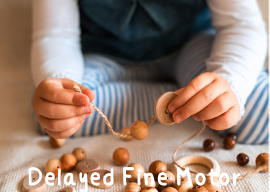Therapy and treatment for delayed motor skills


Facts about delayed motor skills
Fine motor and gross motor skills are closely intertwined, gross motor typically developing first then fine motor. Developmental milestones are set by ages based on what children can do by a typical age. They are great tool to use to check to see on your child’s overall development as well as specific skills like, sitting, standing, walking running, holding small items, feeding, dressing, holding writing utensil and more are where they need to be. Delays in motor skills can have direct impact on overall quality of life.
- Causes: Various factors can contribute to delayed motor skills, including genetic factors, prematurity, low birth weight, environmental factors, and certain medical conditions.
- Variability: Children develop at different rates, and there is a range of what is considered normal. However, if a child consistently lags significantly behind their peers in motor skill development, it may be a cause for concern.
- Impact on Daily Life: Delayed motor skills can affect a child’s ability to participate in age-appropriate activities, both at home and in school. It may influence academic performance, physical activities, and daily routines.
Parents
Parent and caregivers often become worried when they notice their child hasn’t met these milestones. Knowing where to go next to help your child can be overwhelming and confusing. Parents and caregivers play a vital role in recognizing signs of delayed motor skills. Regular developmental check-ups with healthcare providers can help identify any concerns and guide appropriate interventions.
Occupational therapists and physical therapists also have a deep understanding of movement and skill acquisition and are trained to break down what is causing the delay and how to build up prerequisite skills to reach the main goal (ex. walking).
Signs your child may be experiencing a delay in developmental motor skills:
- Late or absent rolling, crawling or walking
- Trouble using or accessing playground equipment
- Avoidance physical activities
- Clumsiness or poor coordination
- Balance problems
- Poor endurance or weak muscles
- Trouble grasping and holding small objects
- Avoidance of craft activities like coloring (don’t like to use crayons, pencils, etc.)
- Avoidance of writing/homework
Don’t wait. Early Intervention is Key.
Identifying and addressing delayed motor skills early on is crucial. Early intervention services, such as physical therapy or occupational therapy, can help children develop the necessary motor skills and catch up with their peers. Delaying intervention increases the gap and makes it harder for children to get caught up as they age. Get them help now to gain the skills they need for tomorrow.
Occupational therapy in Ohio is direct access which means you don’t need to wait on a pediatrician referral to get therapy.